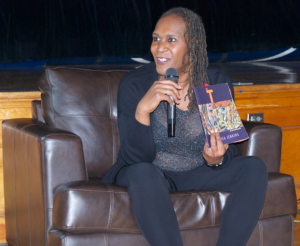
Andrea Jenkins recently visited San Diego as a special guest of the San Diego Human Dignity Foundation. In addition to meeting with the local LGBT community, Andrea also conducted interviews in her current work as curator for the University of Minnesota’s Transgender Oral History Project.
It’s a bit of a challenge to describe Andrea, because she’s done so many things. We might have to settle for calling her a Renaissance Transwoman. She’s a playwright, poet, spoken word artist, social organizer, community developer and transactivist. Her work experiences have included: Manager for the Program in Human Sexuality at the University of Minnesota. Senior policy aide for two Minneapolis City Council Members. Poetry Instructor at Minneapolis College of Art and Design. Nonprofit organization boardmember for Forecast Public Arts, Outfront Minnesota, and The Metropolitan State Alumni Board. Curator for the Queer Voices Reading Series. Performer in Intermedia Arts shows including Vulva Riot, genderBlur, and Queertopia.
On a cold and rainy (but not unlucky!) Friday the 13th, Andrea provided an evening of poetry and life observations at Hillcrest’s LGBT Center. Event sponsors included The Human Dignity Foundation, Transfamily Support Services, Kroger Speciality Pharmacy, and the LGBT Center’s Project Trans. Like a cup of strong black coffee, she stimulated and warmed an appreciative audience.
Some of Andrea’s poetry speaks of her own personal transgender experience. But you don’t have to be transgender to get her message-it’s a universal one. It’s about anyone who is facing the challenge of being true to oneself. It’s about dealing with insecurity, family rejection, and social disapproval. It addresses larger social problems such as racism, poverty, and the prison industrial complex. It references community activists such as Marsha P Johnson, Silvia Rivera, Miss Major, and CeCe McDonald, but could just as easily be referencing Harvey Milk or Dr. Martin Luther King Jr. And when Andrea says “We need to rewrite the narrative of what is, and who is, a woman”, she’s challenging us all to rethink traditional culture which forces identities and roles on everyone.
The arts play a very important role in social change, and Andrea says “If we want to change things for our community, we have to tell our stories. We can only make change if we change hearts and minds…And a big part of making change comes through art and literature, and in my case, poetry”. She also admits that jazz, Hip-Hop, the Blues and music in general are her greatest inspiration: “My poems come to life when there’s music. If there’s no musicality to it, it’s not quite on”.
After her poetry reading, Andrea discussed her current work for the Transgender Oral History Project. She considers it “the most important work I’ve done in my life up to this point … It’s been such an honor to hear, document and preserve the stories…I pretty much ask the same questions, but everyone has a unique perspective on this gender journey they’re on”.
Has she noticed any commonalities in her interviews? Yes. When she asks one standard question “What’s your biggest joy?”, many transgender people tell her about the release of pressure from trying to be someone they aren’t. Despite the loss of jobs, family communication and social stigma, they all feel a newfound relief and freedom to finally be who they really are. Has anything surprised her in her interviews? Yes. She notes the many different types of gender identities. “When I came out 25 years ago, there was just male and female. Now, people say they’re genderqueer, genderfucker, transgender non-binary, transmasculine gay … Out of 135 people we’ve interviewed, there are 65 different gender identities that people have identified themselves as …”
Andrea also touched on the role of youth in the movement for LGBT rights. She notes that young people today, by and large, are less racist, less homophobic and less transphobic than previous generations. They also have a strong analysis of class and justice. But, she notes, “So many young folks feel Drag isn’t a part of our community”. She reminds us that for many people just coming out and with few places to turn to, Drag Queens are the most visible members. The Drag Community is also the first place for a young transperson to find support and cameraderie-and what Laverne Cox calls possibility models.
The Transgender Oral History Project is an exhaustive undertaking. It involves interviewing people across the country, videotaping and editing, transcribing the conversation to provide a written version, cataloging, and uploading online. Participants are sent copies and given sixty days to respond with additions or corrections. The public can find out more about this important work at https://www.lib.umn.edu/tretter/transgender-oral-history-project.
Those interested in learning more about Andrea’s life and work can check out http://andreajenkinspoet.com/ or http://www.intermediaarts.org/Andrea-Jenkins. She has recently published her newest book The T is Not Silent, New and Selected Poems, available for purchase.
And finally, Andrea offers this advice for surviving in our current turbulent times: “Own your victories, no matter how small they may be”.











